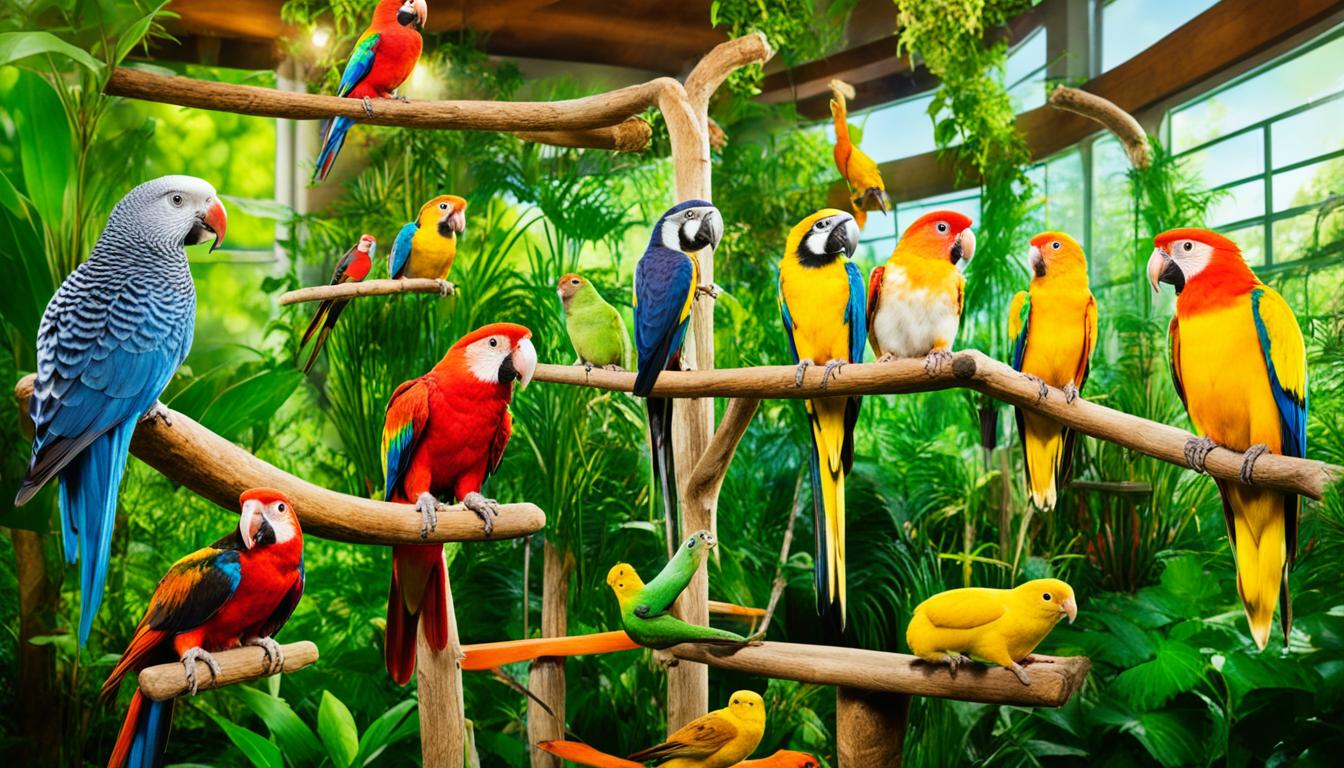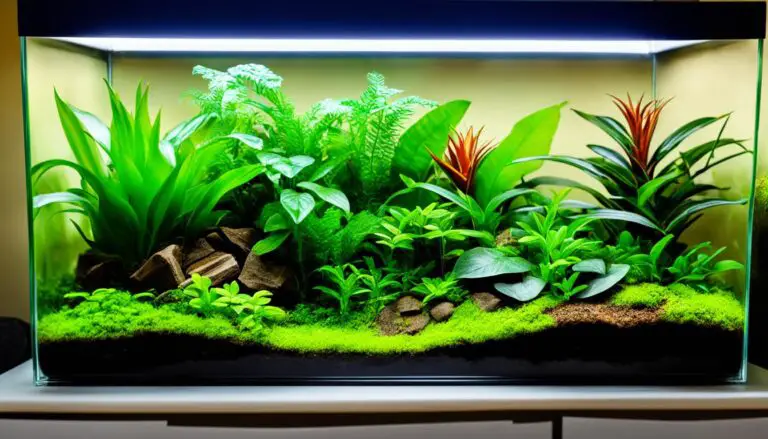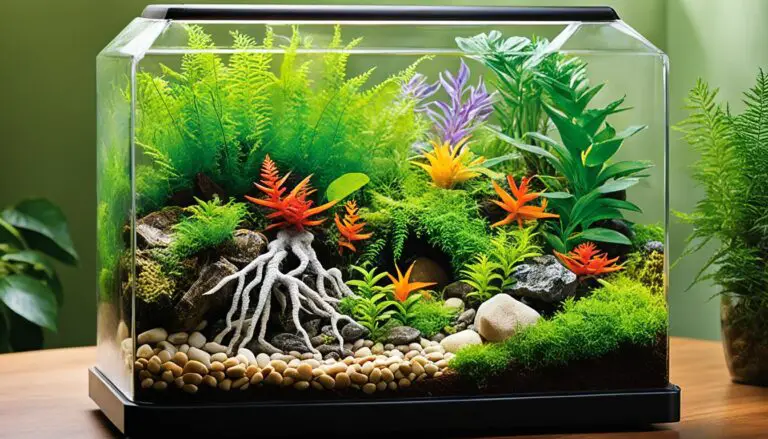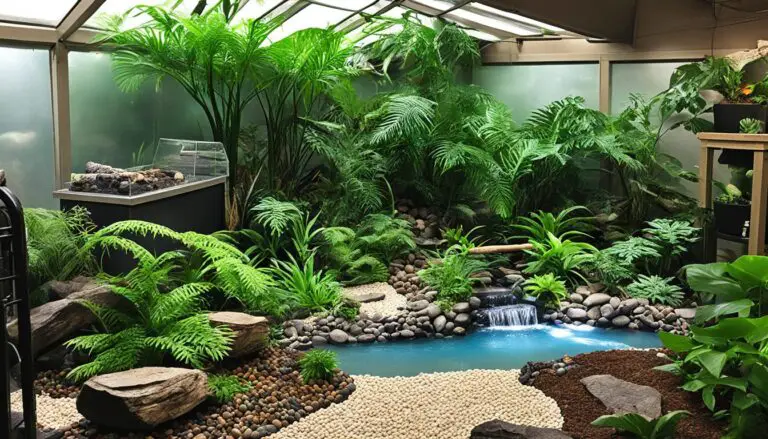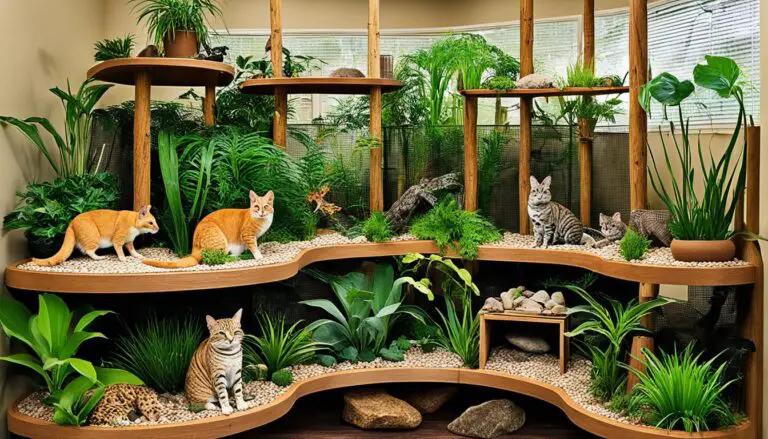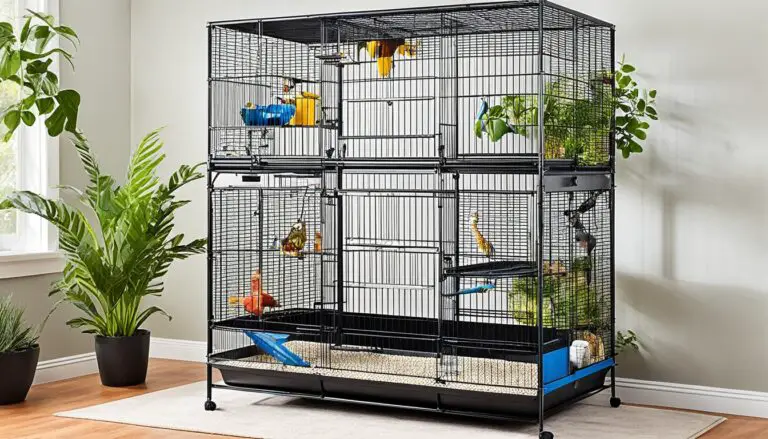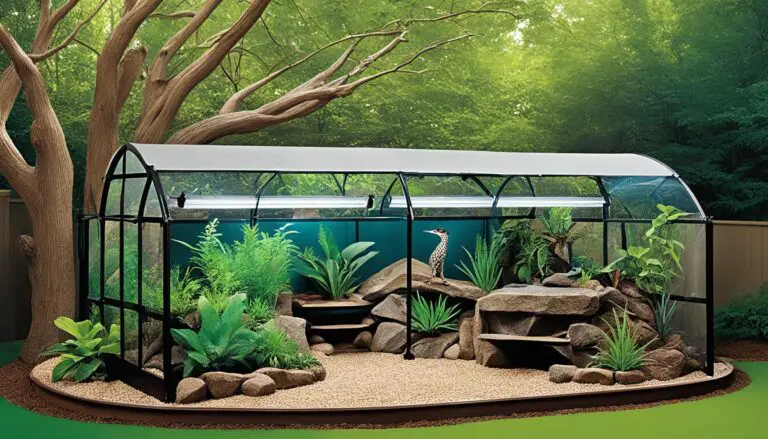Exotic Pet Housing Perches: What to Consider & Tips
Did you know the right housing can greatly help your exotic pet’s happiness and life quality? Finding the perfect perches that suit their needs is key. No matter if you own a reptile or bird, picking the correct perch is vital. It affects their health and keeps their mind active. Let’s dive into the various perch types, materials, and key things to keep in mind. We want to make sure your pet’s home is cozy and safe.
Key Takeaways:
- Choosing the right perch is essential for the well-being of your exotic pet.
- Consider the different types of perches available, such as perches, play stands, and play gyms.
- Materials like wood, metal, rope, plastic, cement, or sand have their pros and cons.
- Size, cleanliness, and placement of perches are important factors to consider.
- High-quality perches from trusted sources ensure the comfort and safety of your pet.
Housing Requirements for Reptiles
Understanding the housing needs of reptiles is key. They need a special kind of home for their health and happiness.
Get their home ready and safe before they arrive. It should have the right light, heat, and water to feel like their natural home.
Indoor and outdoor perches offer them places to climb, watch, and rest. These perches should match different reptiles’ temperature and humidity needs.
When picking perches, think about your reptile’s size and how it acts. Use indoor perches for pets that like being inside. Outdoor perches are good for those that need sun and air.
Make sure to check what your specific reptile needs. This helps you set up the best home and perches for them.
Benefits of Indoor and Outdoor Pet Perches for Reptiles
Indoor pet perches:
- Offer a stable environment with the right temperature and humidity.
- Give reptiles a safe place to climb, rest, and watch around.
- Let you keep an eye on your pet’s behavior and health at home.
Outdoor pet perches:
- Let reptiles get sunlight, which helps their health and vitamin D.
- Offer a bigger space for reptiles to explore and enjoy.
- Give reptiles fresh air and natural things to see and do.
Expert Tip: Choosing the Right Indoor and Outdoor Perches
“When choosing perches for your reptiles, their needs and likes matter. For example, tree-loving reptiles like geckos and chameleons do well on tall, strong perches. Ground-dwelling species like tortoises might like lower perches. Always think of your reptile’s safety and comfort first when picking perches.”
Knowing what reptiles need for their homes and picking the right perches makes their lives better. Always talk to experts or check reptile care info to be sure you’re doing everything right for them.
Choosing the Right Perch for Birds
Birds need perches for rest, playing, and watching their surroundings. The best perch can make them happy and active. Think about the perch’s size, what it’s made of, how comfortable it is, and how easy it is to clean.
Types of Perches
There are many perch types like simple perches, play stands, and gyms. Each one offers something special for your bird.
Having perches of different sizes and textures is good. It keeps your bird’s feet healthy.
Materials for Perches
Choosing the right material for your bird’s perch is important:
- Wood: Wood provides a natural and comfortable option for birds to grip and chew. They come in various sizes to fit any cage perfectly.
- Metal: Metal perches last long and are simple to keep clean. They work best for bigger birds.
- Rope: Rope perches are soft, lowering the chance of foot injuries. They offer a comfy spot for your bird to relax.
- Plastic: Plastic perches are light and simple to keep clean. But, they can be slippery, so choose carefully.
- Cement or Sand: These perches can help keep a bird’s beak and nails short. But, don’t use them alone as they can irritate the feet if used too much.
Keeping Perches Clean
Cleaning perches often is key to stop bacteria or pests. Clear off droppings or dirt each day. Use a safe cleaner for birds now and then.

By picking the right size, material, and cleanable perch, you create a good space for your bird. This supports their body and mind health.
| Perch Type | Advantages | Disadvantages |
|---|---|---|
| Wood | Natural feel, comfortable grip, customizable | Can harbor pests or harmful fungi if not properly maintained |
| Metal | Durable, easy to clean | Can be slippery, may not provide enough texture for grip |
| Rope | Soft and flexible surface, reduces risk of foot injuries | May fray or need replacement over time |
| Plastic | Lightweight, easy to clean | Can be slippery, may not withstand heavy chewing |
| Cement or Sand | Helps trim beak and nails | Overuse can cause irritation, should not be the only perch option |
Perch Material Considerations
Choosing the right perch material is key for your exotic pets’ comfort and safety. Different materials bring their own pros and cons. We will look at some common perch materials and how they fit with exotic pets.
Natural Wood Perches
Natural wood perches are a top pick because they feel like the wild. They give pets a good grip and something to chew on. This is crucial for their mental happiness and foot wellness. Yet, you must pick safe woods as some can be harmful.
Hemp Perches
Hemp perches are both soft and tough. This makes them great for chew-happy birds. They also offer a natural grip. This can help keep your pets’ feet healthy and avoid foot problems.
Rope Perches
Rope perches work well for older birds with joint issues. They’re softer, easing joint pressure and adding comfort. They also let birds change their grip, which is good for exercise.
Cement or Sand Perches
Cement or sand perches have a rough surface to naturally trim beaks and nails. But, they shouldn’t be the only perch you use. They’re not as comfy or versatile for gripping. It’s key to have a mix of perches to avoid hurting your pet’s feet.
Plastic Perches
Plastic perches are loved for being easy to clean. They resist stains, making cleaning a breeze. But, some birds might find them too slippery, which can cause falls. Plus, big birds might chew through them. So, it’s important to pick strong, bird-safe plastics.
Think about what your exotic pets need, like, and must have based on their species. Having different perch materials will keep them both mentally and physically lively. This creates a happy and engaging home for your pets.
Placement and Cleaning of Perches
Perches are key for the well-being of your exotic pets. Think about what they like when placing the perches. You can put them inside the cage, on the floor, or on a table.
Different sizes and textures of perches keep pets happy and their feet healthy. Offer perches made of wood, rope, or other materials. These can make their home better.
Clean perches often to keep pets healthy. Use a homemade disinfectant to get rid of dirt and germs. Make cleaning a regular part of pet care.
| Placement Options | Advantages |
|---|---|
| Inside the Cage | Provides a designated resting and perching spot for pets |
| On the Floor | Allows for interactive play and exploration |
| On a Tabletop | Facilitates training and socializing with your pets |
Choose perches that are tough against chewing and scratching. This makes them last longer. They must also hold up to pets’ natural behaviors. This gives pets a secure and fun space.
Proper Cleaning Method
Cleaning perches well is important for your pets’ health. Here’s how to clean them properly:
- Remove the perches from the cage or play area.
- Scrub them gently using a brush or sponge with warm water and mild soap.
- Rinse the perches thoroughly to remove any soap residue.
- Allow the perches to air dry completely before placing them back in the cage or play area.
With the right perch placement and cleaning, your pets will have a cozy and clean home to enjoy.
Importance of Perches for Exotic Birds
Exotic birds need the right habitats, and correct perches are key. These perches are not just for resting. They let birds chew, claw, and climb as they would in the wild. So, picking suitable perches is vital for their comfort and to keep them active.
Natural material perches, like wood, are top choices. They make birds feel more at home, letting them grip and chew easily. But be sure to select perches that are safe for birds. They must be free from harmful bugs or fungi to avoid health issues.
Soft perches, like those made from hemp or rope, are great for older birds. They help ease joint pain by providing a soft landing spot. Offering different materials can also make their space fun and engaging.
While natural perches are best, mixing in other materials is key. Cement or concrete perches can trim beaks and nails, keeping birds neat. Still, these shouldn’t be the only option. They lack texture for safe gripping. Plastic perches are easy to clean but may also be too smooth for birds.
“Perches play a vital role in the physical and mental health of exotic birds. Providing a variety of perches made from different materials ensures a stimulating environment that closely mimics their natural habitat.” – Dr. Jane Peterson, Avian Behavior Specialist
Picking the right perches helps you create a great space for your exotic birds. Think about what your bird likes and needs. Consider material, comfort, cleanliness, and safety. A diverse and fun perch setup helps your bird thrive.
Exotic Bird Perch Options
Different perches meet the varied needs of exotic birds:
- Wood perches: Mimic a bird’s natural habitat and provide a comfortable surface for gripping and chewing.
- Hemp and rope perches: Offer a soft and cushioned surface, suitable for older birds with joint issues.
- Cement or concrete perches: Aid in beak and nail trimming, promoting good hygiene.
- Plastic perches: Easy to clean but may not provide enough texture for safe gripping.
Consider these options to give your exotic bird a comfy and enriching environment.
Choosing Perches from a Trusted Source
Choosing the right perches for your exotic pet is vital. Make sure to pick from a reliable source offering designer perches made for exotic pets. Todd Marcus Birds Exotic is known for its high-quality and safe perches.

“We focus on quality at Todd Marcus Birds Exotic,” says Todd Marcus, the founder. “Our team carefully crafts each perch. We ensure they are both functional and beautiful.”
Todd Marcus Birds Exotic is famous for its beautifully crafted perches. They use wood, hemp, rope, and even cement or sand. Each material is chosen to ensure your pet’s comfort and stimulation.
Wooden Perches: Combining Natural Beauty and Bird Safety
Wooden perches at Todd Marcus Birds Exotic are safe and beautiful. They are made from quality wood. This mimics the natural environment and provides a good surface for your pet to grip and chew. There are also various sizes and shapes to meet the needs of different pets.
Hemp and Rope Perches: Soft Surfaces for Ultimate Comfort
For a soft and durable perch, consider hemp and rope perches from Todd Marcus Birds Exotic. These provide a comfortable place for your pet’s feet. They are great for pets with arthritis or joint issues. The natural fibers are also good for birds that like to chew.
Cement or Sand Perches: Promoting Beak and Nail Health
Cement or sand perches from Todd Marcus Birds Exotic are good for pets needing beak and nail care. These perches help pets naturally maintain their beaks and nails. Still, it’s best to use these perches along with others to avoid too much roughness.
By choosing your pet’s perches from Todd Marcus Birds Exotic, you ensure their comfort, safety, and stimulation. This helps your exotic pet live well in captivity.
| Premium Pet Perches from Todd Marcus Birds Exotic: | Features: |
|---|---|
| Wooden Perches | Mimics natural habitats, bird-safe, available in various sizes and shapes |
| Hemp and Rope Perches | Soft and durable surface, ideal for older pets with arthritis, promotes chewing and unraveling |
| Cement or Sand Perches | Helps maintain beak and nail health, acts as a natural file, requires supplementation with other perch types |
Conclusion
It’s vital to choose the right housing perches for your exotic pets. Considering their type, needs, and what perches are made from is critical. Think about the variety and where to place them too.
Providing proper perches boosts your pet’s health and happiness. Choose natural wood for a home-like feel or soft materials like hemp. This makes a big difference.
Variety is key to keep your pet interested. Different sizes and materials help avoid boredom. Clean them regularly to stop bacteria.
Take your time to find high-quality perches from trusted sources. The right perches make your pet’s space comfy and keep them happy.
FAQ
What are the important considerations when choosing pet perches?
What are the housing requirements for reptiles?
What should I consider when choosing perches for birds?
What are the important perch material considerations?
Where should I place and how should I clean the perches?
Why are perches important for exotic birds?
How do I choose perches from a trusted source?
What should I consider when providing suitable housing perches for my exotic pet?
Source Links
- https://www.merckvetmanual.com/all-other-pets/reptiles/providing-a-home-for-a-reptile
- https://thebirdstore.com/something-to-chew-on-the-best-materials-for-exotic-bird-perches/
- https://www.wayfair.com/sca/ideas-and-advice/guides/how-to-choose-a-perch-for-your-bird-T21201
Peter Stones is the founder of Exotic Pets Place, the leading online resource for exotic pet care information.
With over 10 years of hands-on exotic pet ownership experience, he is deeply passionate about sharing his expertise to help others properly care for their unusual pets.
When he's not writing extensively researched articles or connecting with fellow exotic pet enthusiasts worldwide, you can find Peter at home tending to his own beloved menagerie of exotic animals.

